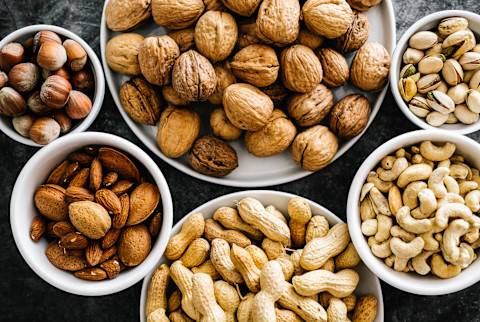Why You Need Melatonin In Your Diet (Other Than For Sleep) + An MD's Go-To Foods

When someone brings up melatonin, it's usually within the context of a good night's rest. This makes sense: Melatonin is the sleepy-time hormone, after all, signaling to your body that it's time to wind down. So on the topic of melatonin-rich foods, most of the time we're focusing on bedtime snacks to help prep your brain and body for quality sleep.
However! Cardiologist and New York Times bestselling author Steven Gundry, M.D., says melatonin has another, equally important, role to play. And it has nothing to do with catching Zzz's: "It turns out, melatonin may be the most important antioxidant1 for mitochondria [health]," he says on the mindbodygreen podcast.
How melatonin benefits mitochondrial health.
A quick primer: Mitochondria are the powerhouses of the cells, meaning they help power up the energy that allows all the cells in your body to function optimally. But like most good things, mitochondria deplete with age—that's why many experts recommend optimizing its function as you grow older, through nutrient-dense foods, fasting, exercise, and supplements. (Check out our full explainer on mitochondrial health here.)
As for where melatonin comes in, "Mitochondria will actually manufacture melatonin," Gundry says, and research shows melatonin also has a protective effect, able to help maintain mitochondrial function2. "Melatonin reduces mitochondrial fission and increases their fusion, thereby preserving their normal function," the report reads. Needless to say, melatonin's benefits extend way beyond a good night's rest.
Gundry's go-to food sources.
Below, find his favorites:
Pistachios
Pistachios happen to be Gundry's all-time favorite nut, just because of their high melatonin content. In fact, one analysis conducted by researchers at Louisiana State University and American Pistachio Growers found that pistachios contain about 660 nanograms of melatonin per gram—a remarkably higher number than other fruits, vegetables, nuts, and seeds.
Olive oil
Olive oil is beloved for its healthy monounsaturated fats and vitamin profile, but Gundry says don't sleep on its melatonin content. "A lot of the things that we've attributed to the Mediterranean diet as being healthy, like olive oil, these are remarkable sources of melatonin," he explains. In fact, research shows that among the phytochemicals and polyphenols rife within the Mediterranean diet menu, melatonin might add another layer of protective effects3.
Red wine
Another Mediterranean diet staple, Gundry also mentions that red wine doesn't just boast resveratrol—it also features melatonin. Research backs this up, with a study showing significant amounts of melatonin in grape skins used to make red wine, which may contribute to its antioxidant activity.
That doesn't mean you must guzzle down glasses of wine to reap the benefits, though—you can also consume melatonin through grape-related foodstuffs, like grape juice and grape vinegar, according to another review.
The takeaway.
While melatonin is largely associated with sleep, it has significant benefits for your mitochondrial health—which, in case you didn't know, powers literally every cell in your body. That said, it's vital for pretty much every function, and while you do produce melatonin naturally, it doesn't hurt to reap the benefits of a few rich food sources.
